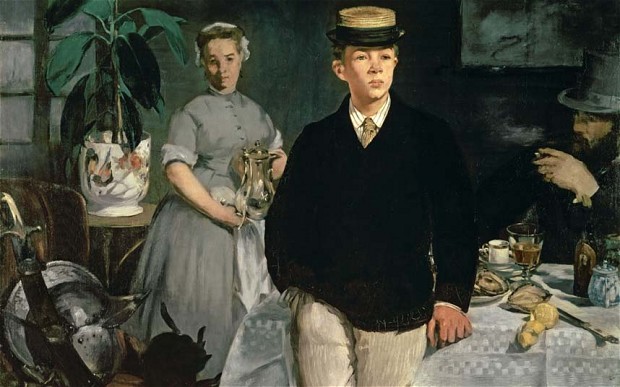
Gangrene
by ELLEN COPPERFIELD
Until the last years of his life, Manet never read novels.
Midway through the year 1876, Manet's left foot troubled him. The pain was intense, as was the frequent numbness. The symptoms of severe syphilis had not emerged until now, but they were out in full force. He wrote off the constant aches and pains to bouts of rheumatism. By the end of the year his only desire was to find a doctor that could abate whatever was wrong with him. Various homeopathic remedies were attempted without success; he tried hydrotherapy in order to restore nerve function in the limb.

He was not really able to leave his new Paris studio, so his friends had to come to him. Surrounded by the canvases of his career, it was easier for Manet to avoid work by socializing into the long hours. His legs could not carry him anywhere else by then.
Manet became fascinated by the daughter of Paris' finest jeweler, a girl named Isabelle Lemonnier. Her wrote her short messages with little sketches of things. In 1879 she was enraptured enough by his attention that she sat for six portraits. Manet's wife and mother were sick, and he needed a distraction.

Near the end of the year he collapsed in a Paris street from pain. His hair loss was often commented on, and he used up four to five hours a day at a clinic said to treat circulatory disorders. For the first time critics were giving his work the semblance of a proper appreciation, but his ill health soured everything, giving him the revolting idea that he would only become famous after death. He was 50.
Optimism was farfetched. He wrote to a friend in 1880, "As you put it so well, time is a great healer. And so I am counting heavily on it. I live like a mollusk in the sun, when there is any, as much as possible outdoors, but without any doubt, the country has charms only for those aren't forced to stay there."

Novels provided a welcome relief from his constant pain. His friend Antonin Proust suggested that "he did not seek in his reading literary pleasure but distraction from the pain of ataxia." He knew now that he was nearing the end. He was reduced to simple portraits of flowers; anything else was beyond his current capabilities. Against his better judgment, Manet began to feel sorry for himself.
His left leg turned entirely black. Doctors took a week to decide whether it was even worth operating on, but eventually they decided to amputate. The nails on his foot flaked off at the gentlest touch. All that was left were his deep blue eyes. He was barely aware of the operation occurring, but eventually seemed to grasp the absence of the limb, raising the sheet to observe that it was missing. He finally gave up on April 30th of 1883.
Ellen Copperfield is the senior contributor to This Recording.

"Heading Home" - Julianna Barwick (mp3)
